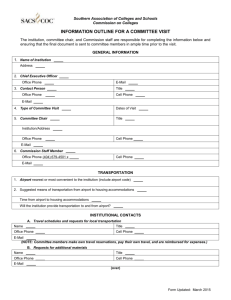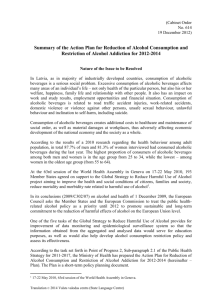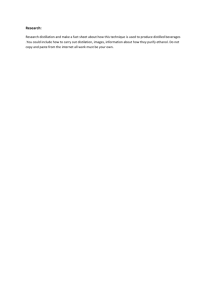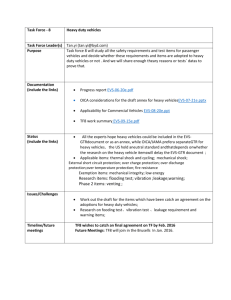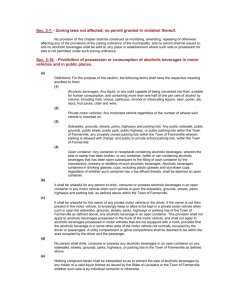ClwSupp_6170-2008-01
advertisement
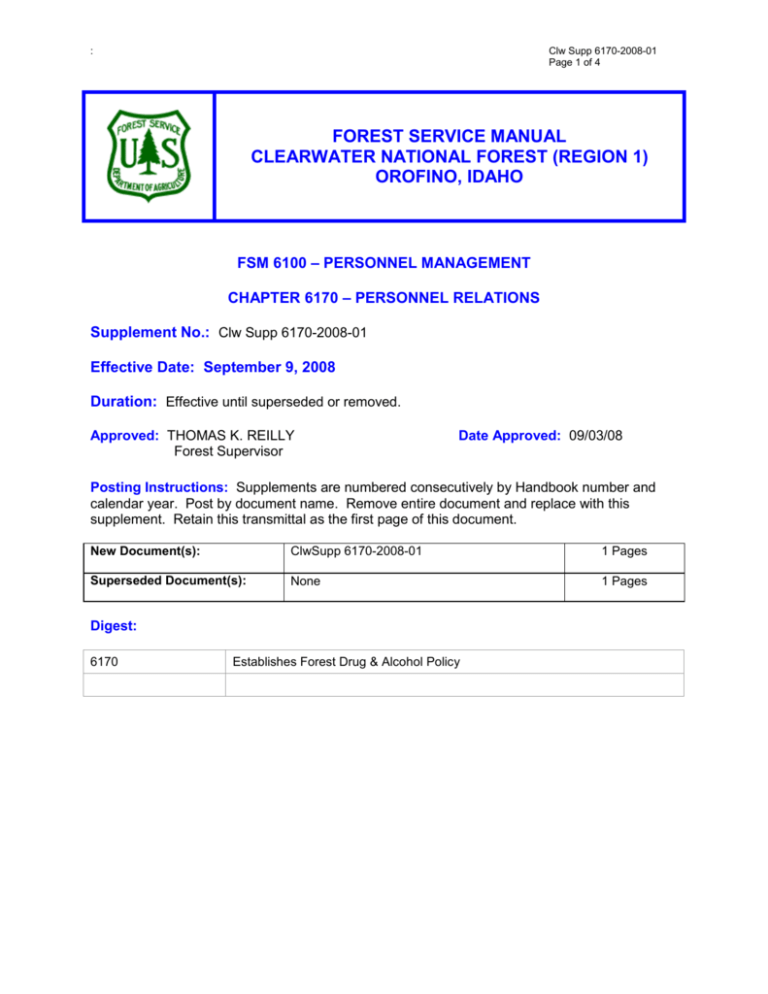
: Clw Supp 6170-2008-01 Page 1 of 4 FOREST SERVICE MANUAL CLEARWATER NATIONAL FOREST (REGION 1) OROFINO, IDAHO FSM 6100 – PERSONNEL MANAGEMENT CHAPTER 6170 – PERSONNEL RELATIONS Supplement No.: Clw Supp 6170-2008-01 Effective Date: September 9, 2008 Duration: Effective until superseded or removed. Approved: THOMAS K. REILLY Forest Supervisor Date Approved: 09/03/08 Posting Instructions: Supplements are numbered consecutively by Handbook number and calendar year. Post by document name. Remove entire document and replace with this supplement. Retain this transmittal as the first page of this document. New Document(s): ClwSupp 6170-2008-01 1 Pages Superseded Document(s): None 1 Pages Digest: 6170 Establishes Forest Drug & Alcohol Policy R1 CLEARWATER NF SUPPLEMENT EFFECTIVE DATE: 09/09/2008 DURATION: Effective until superseded or removed Clw Supp 6170-2008-01 Page 2 of 4 FSM 6100 – PERSONNEL MANAGMENET CHAPTER 6170 – PERSONNEL RELATIONS 6170 – Drug and Alcohol Policy Application This policy is an extension of USDA Directive 4070-735-001 dated October 4, 2007 in conjunction with 5 United States Code (USC), Chapter 73, Suitability, Security, and Conduct; Executive Orders 12674 and 12731, Principles of Ethical Conduct for Government Officers and Employees; 5 Code of Federal Regulation (CFR) part 735, Employee Responsibilities and Conduct; 5 CFR, part 2635, Standards of Ethical Conduct for Employees of the Executive Branch and 5 CFR, part 8301, Supplemental Standards of Ethical Conduct for Employees of the Department of Agriculture. Employees shall adhere to these and other related standards, policies, and regulations promulgated by USDA and its agencies. The intent of this policy is to address specific situations that are not adequately described in the above. These situations most commonly arise at remote duty stations and backcountry assignments. I. Drugs There is a "zero tolerance" for illegal drug use by federal employees on or off the job, as established by Executive Order 12564. Drug use or possession will not be tolerated on government property or in government vehicles. Some positions including those that require the use of firearms or commercial drivers’ licenses are subject to random drug testing. Also, USDA has established a Reasonable Suspicion and Post Accident Drug Testing Policy and those procedures will be followed. II. Alcohol State Law The legal age for possession and consumption of alcoholic beverages in Idaho is 21 years. Alcohol use by employees under that age is not permitted in any location or under any circumstances. Driving while under the influence of alcohol or consuming alcohol while driving is illegal. Procuring alcohol for consumption by underage persons is also illegal. Transport With Government Vehicles and Livestock Transportation of alcoholic beverages with government vehicles or livestock is permitted only in the specific situations described below: Transport to Remote Duty Locations. Personnel performing work that requires an overnight stay at remote camps or remote stations are authorized to transport a reasonable quantity (see definitions) of alcoholic beverages for their personal use in a government vehicle when there is no private vehicle from their work group or crew making the same trip. Transportation with government vehicles is always the least preferable choice and is to be used only when transport in private vehicles is not a viable option. Employees will not purchase alcoholic beverages while driving government vehicles, nor will such beverages be loaded into government vehicles at stores or in other public locations. During transport in a government vehicle, alcoholic beverages will be stowed unobtrusively with the employee's personal gear and always outside the passenger compartment. R1 CLEARWATER NF SUPPLEMENT EFFECTIVE DATE: 09/09/2008 DURATION: Effective until superseded or removed Clw Supp 6170-2008-01 Page 3 of 4 FSM 6100 – PERSONNEL MANAGMENET CHAPTER 6170 – PERSONNEL RELATIONS Storage / Disposal Alcoholic beverages will be stored unobtrusively at camps and other stations. Refrigerators in private quarters will be used in preference to refrigerators in common or public spaces whenever they are available. Alcoholic beverages will not be stored in the quarters of underage employees. Empty containers are to be appropriately disposed of immediately in a garbage bag or other suitable closed trash receptacle. Containers scattered, piled, or in open trash receptacles are not acceptable. Containers transported to remote camps will always be packed out for disposal at work centers or ranger stations - dumpsters at recreation sites will never be used. Consumption / Behavior There are specific standards for employee conduct on the job relating to harassment, abuse, and the general work environment for employees and supervisors. Since people react to alcohol differently the standard to be met will be based on job performance and behavior. Behavior standards will also apply in certain off-duty settings where employee actions may directly reflect on the Forest Service or affect other employees. Examples of unacceptable behavior: Alcohol use during working hours or in a government vehicle. Consumption after hours that interferes employee's ability to report for work on time and fit for duty. Consumption of alcohol in camps that leads to behavior that is conspicuous or offensive to the public or to other employees. Consumption that leads to camp conditions that are unprofessional. Use of alcohol that leads to abusive, threatening, or harassing or otherwise inappropriate behavior toward supervisors, other employees, FS volunteers or the public. Consumption that leads to a degree of impairment that puts the employee or others at risk of injury. This is of particular concern in remote camps due to potential government liability. Intoxication during or after-hours in training situations like fire guard school where the event has a high community profile and employee behavior obviously reflects directly on the Forest Service. Consumption in public settings during or after working hours while wearing the FS uniform or fire clothes. Responsibility of Supervisors and Employees It is the direct responsibility of all supervisors to explain this policy and related regulations to their employees, to enforce them, and to take appropriate action if violations occur. District Rangers and other supervisors have the authority to prohibit alcohol transport in government vehicles or use at any remote camp or remote station for any individual or crew that has violated this policy. It is the supervisor's responsibility to inquire about alcohol consumption off-duty and to assess an employee's fitness for duty when returning an off-duty employee to duty status unexpectedly. This situation occurs frequently in fire situations that arise on weekends or after-hours. The supervisor's assessment here is the final word on when an employee returns to duty status and under what conditions. All employees have the responsibility to report crimes that they see committed or they suspect have been committed to their supervisor, District Ranger, or other appropriate authorities. R1 CLEARWATER NF SUPPLEMENT EFFECTIVE DATE: 09/09/2008 DURATION: Effective until superseded or removed Clw Supp 6170-2008-01 Page 4 of 4 FSM 6100 – PERSONNEL MANAGMENET CHAPTER 6170 – PERSONNEL RELATIONS Definitions Reasonable Quantity of alcoholic beverages means a quantity appropriate for refreshment purposes and is based on the number of consumers and length of assignment. This quantity may be significantly reduced or be zero when it affects the cost or logistics of transportation - a situation that can occur when pack strings are the transport method. Remote Camp is a temporary duty location where an employee or crew will spend one or more nights using camp equipment (trailers, tents, etc.) in a location that is a considerable distance from towns and permanent FS facilities. Fire camps will never be considered to be remote camps. Remote Station is defined here only for the purposes of determining whether or not alcoholic beverages can be transported there in a government vehicle under this policy. In this context, remote station means a work center, ranger station, or other permanent FS facility that is not the employee's official duty station and where alcoholic beverages cannot be purchased commercially nearby. It is considered a remote station only for those employees who must travel there via government vehicle. Note that a station may be considered a remote station for some people but not others. For example, Canyon Work center would be considered a remote station for someone whose duty station is Orofino and who is traveling there for several days official business using a government vehicle. In contrast, it would not be considered a remote station for a seasonal employee for whom it is the official duty station. Fire Camps are established on a temporary basis for wildfire management or suppression. They may be located in remote areas or at or adjacent to permanent FS facilities. Alcoholic beverages are not permitted in fire camps and will not be transported to fire camps in government vehicles under any circumstances.

